Corporations Law Case Study Analysis Report - UHWO Spring 2017
VerifiedAdded on 2022/12/19
|19
|4917
|45
Report
AI Summary
This report provides a detailed analysis of a Corporations Law case study, covering a wide range of topics relevant to business law. The report begins by exploring fundamental legal concepts such as the function of law in society, legal reasoning, and the impact of the legal environment on business decision-making. It then delves into key areas including court jurisdiction, alternative dispute resolution (ADR) methods, and civil procedures. The report examines constitutional authority to regulate business, business ethics, and different types of torts. Intellectual property rights, internet law, criminal law, contract law, and various elements of a contract are also discussed. The analysis covers topics such as consideration, capacity, legality, mistakes, fraud, and writing requirements. Additionally, the report addresses third-party rights, performance and discharge of contracts, breach of contract and remedies, and negotiable instruments. The report also touches upon creditors' rights, secured transactions, business organizations, small business law, and government regulations. Finally, the report covers administrative law, consumer law, and the process of formal administrative adjudication. The report aims to provide a comprehensive overview of the key concepts and principles of corporations law and their practical implications.
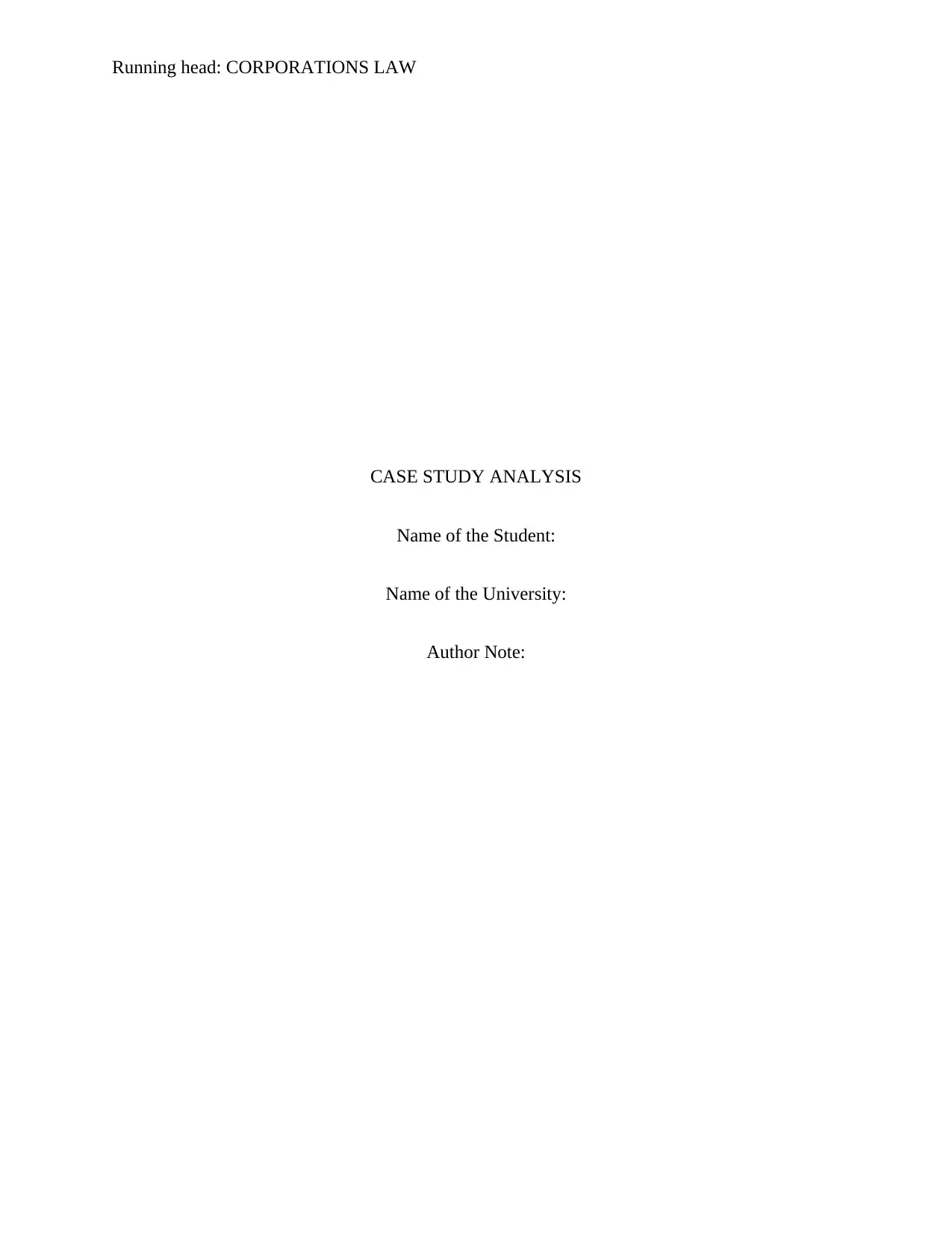
Running head: CORPORATIONS LAW
CASE STUDY ANALYSIS
Name of the Student:
Name of the University:
Author Note:
CASE STUDY ANALYSIS
Name of the Student:
Name of the University:
Author Note:
Paraphrase This Document
Need a fresh take? Get an instant paraphrase of this document with our AI Paraphraser
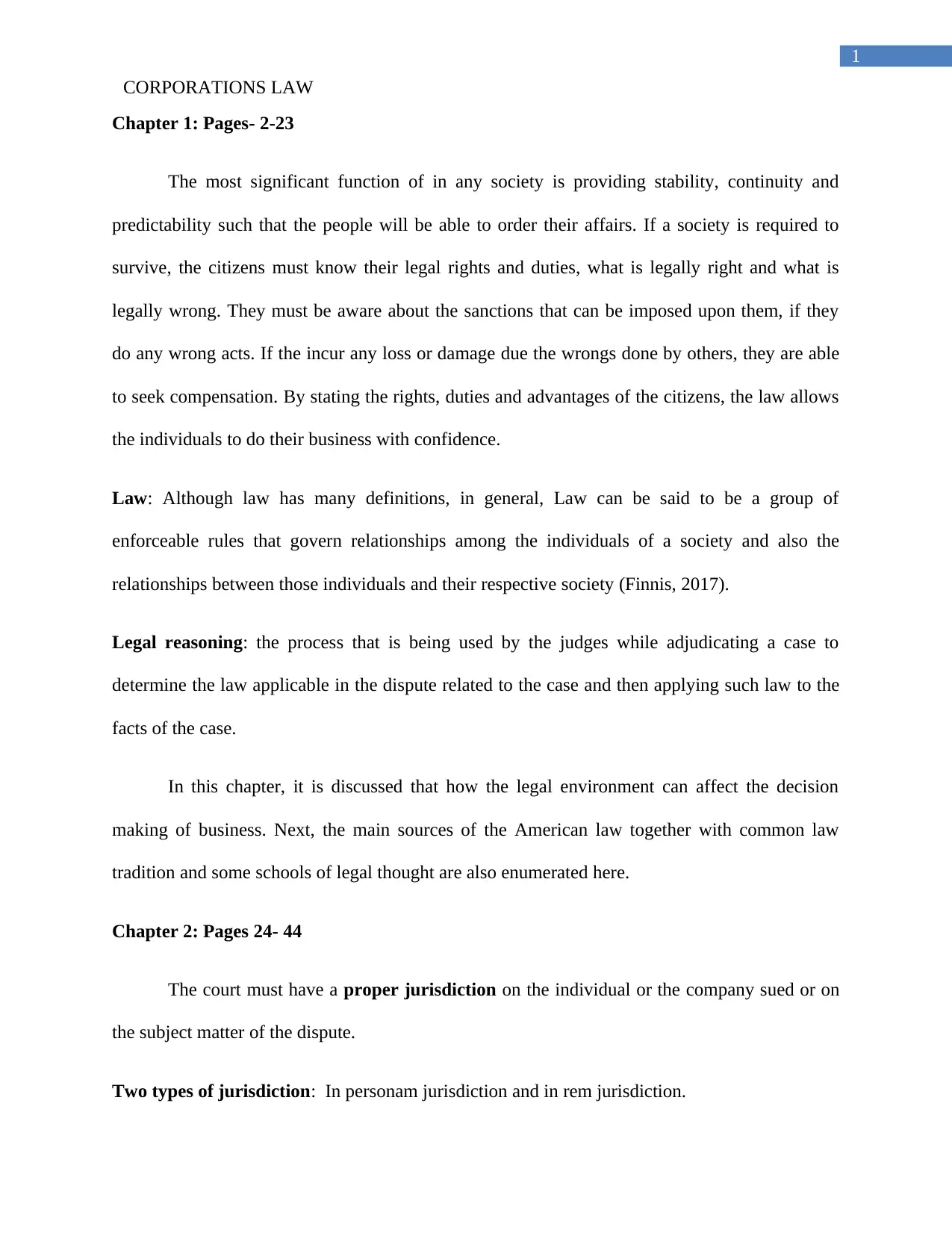
1
CORPORATIONS LAW
Chapter 1: Pages- 2-23
The most significant function of in any society is providing stability, continuity and
predictability such that the people will be able to order their affairs. If a society is required to
survive, the citizens must know their legal rights and duties, what is legally right and what is
legally wrong. They must be aware about the sanctions that can be imposed upon them, if they
do any wrong acts. If the incur any loss or damage due the wrongs done by others, they are able
to seek compensation. By stating the rights, duties and advantages of the citizens, the law allows
the individuals to do their business with confidence.
Law: Although law has many definitions, in general, Law can be said to be a group of
enforceable rules that govern relationships among the individuals of a society and also the
relationships between those individuals and their respective society (Finnis, 2017).
Legal reasoning: the process that is being used by the judges while adjudicating a case to
determine the law applicable in the dispute related to the case and then applying such law to the
facts of the case.
In this chapter, it is discussed that how the legal environment can affect the decision
making of business. Next, the main sources of the American law together with common law
tradition and some schools of legal thought are also enumerated here.
Chapter 2: Pages 24- 44
The court must have a proper jurisdiction on the individual or the company sued or on
the subject matter of the dispute.
Two types of jurisdiction: In personam jurisdiction and in rem jurisdiction.
CORPORATIONS LAW
Chapter 1: Pages- 2-23
The most significant function of in any society is providing stability, continuity and
predictability such that the people will be able to order their affairs. If a society is required to
survive, the citizens must know their legal rights and duties, what is legally right and what is
legally wrong. They must be aware about the sanctions that can be imposed upon them, if they
do any wrong acts. If the incur any loss or damage due the wrongs done by others, they are able
to seek compensation. By stating the rights, duties and advantages of the citizens, the law allows
the individuals to do their business with confidence.
Law: Although law has many definitions, in general, Law can be said to be a group of
enforceable rules that govern relationships among the individuals of a society and also the
relationships between those individuals and their respective society (Finnis, 2017).
Legal reasoning: the process that is being used by the judges while adjudicating a case to
determine the law applicable in the dispute related to the case and then applying such law to the
facts of the case.
In this chapter, it is discussed that how the legal environment can affect the decision
making of business. Next, the main sources of the American law together with common law
tradition and some schools of legal thought are also enumerated here.
Chapter 2: Pages 24- 44
The court must have a proper jurisdiction on the individual or the company sued or on
the subject matter of the dispute.
Two types of jurisdiction: In personam jurisdiction and in rem jurisdiction.
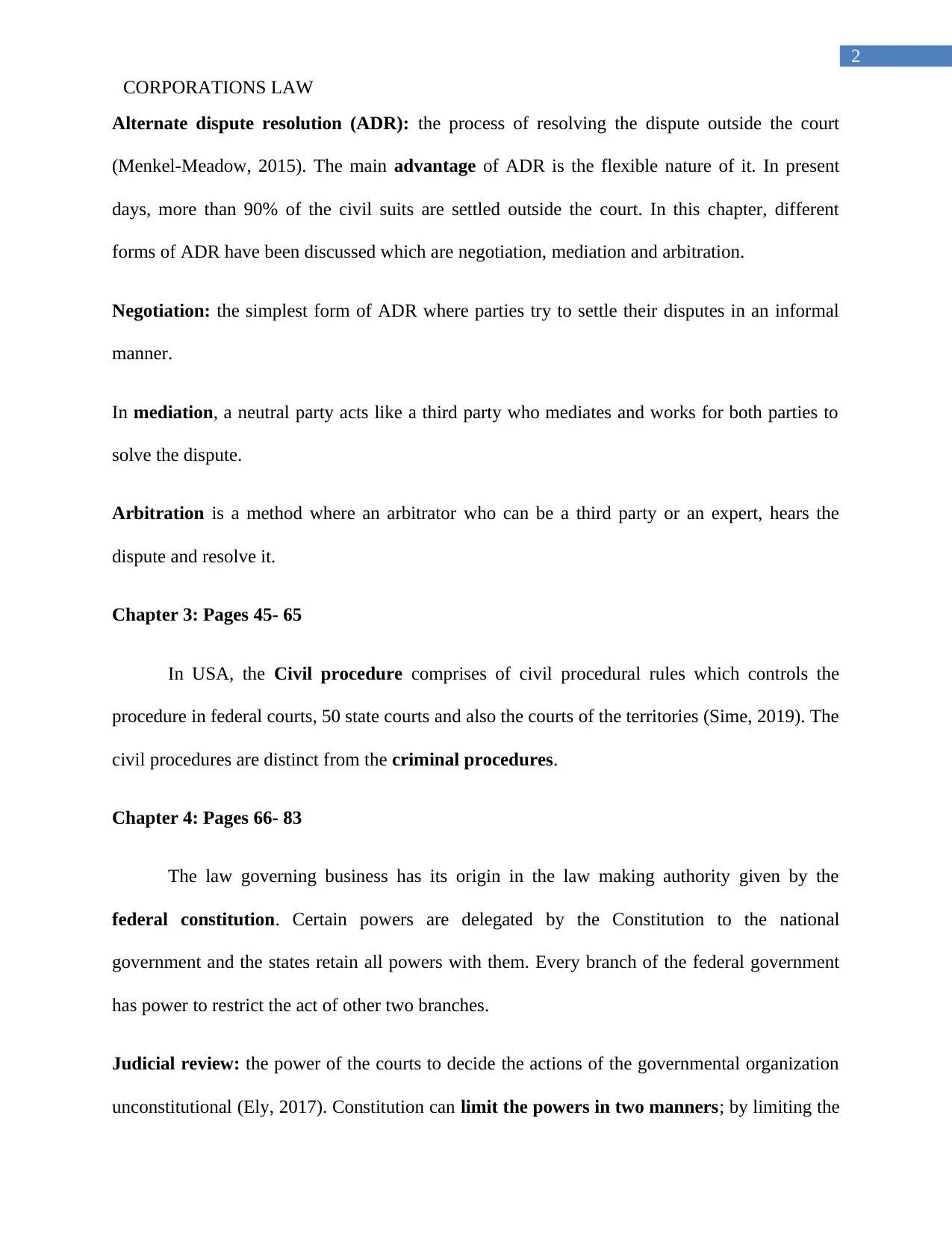
2
CORPORATIONS LAW
Alternate dispute resolution (ADR): the process of resolving the dispute outside the court
(Menkel-Meadow, 2015). The main advantage of ADR is the flexible nature of it. In present
days, more than 90% of the civil suits are settled outside the court. In this chapter, different
forms of ADR have been discussed which are negotiation, mediation and arbitration.
Negotiation: the simplest form of ADR where parties try to settle their disputes in an informal
manner.
In mediation, a neutral party acts like a third party who mediates and works for both parties to
solve the dispute.
Arbitration is a method where an arbitrator who can be a third party or an expert, hears the
dispute and resolve it.
Chapter 3: Pages 45- 65
In USA, the Civil procedure comprises of civil procedural rules which controls the
procedure in federal courts, 50 state courts and also the courts of the territories (Sime, 2019). The
civil procedures are distinct from the criminal procedures.
Chapter 4: Pages 66- 83
The law governing business has its origin in the law making authority given by the
federal constitution. Certain powers are delegated by the Constitution to the national
government and the states retain all powers with them. Every branch of the federal government
has power to restrict the act of other two branches.
Judicial review: the power of the courts to decide the actions of the governmental organization
unconstitutional (Ely, 2017). Constitution can limit the powers in two manners; by limiting the
CORPORATIONS LAW
Alternate dispute resolution (ADR): the process of resolving the dispute outside the court
(Menkel-Meadow, 2015). The main advantage of ADR is the flexible nature of it. In present
days, more than 90% of the civil suits are settled outside the court. In this chapter, different
forms of ADR have been discussed which are negotiation, mediation and arbitration.
Negotiation: the simplest form of ADR where parties try to settle their disputes in an informal
manner.
In mediation, a neutral party acts like a third party who mediates and works for both parties to
solve the dispute.
Arbitration is a method where an arbitrator who can be a third party or an expert, hears the
dispute and resolve it.
Chapter 3: Pages 45- 65
In USA, the Civil procedure comprises of civil procedural rules which controls the
procedure in federal courts, 50 state courts and also the courts of the territories (Sime, 2019). The
civil procedures are distinct from the criminal procedures.
Chapter 4: Pages 66- 83
The law governing business has its origin in the law making authority given by the
federal constitution. Certain powers are delegated by the Constitution to the national
government and the states retain all powers with them. Every branch of the federal government
has power to restrict the act of other two branches.
Judicial review: the power of the courts to decide the actions of the governmental organization
unconstitutional (Ely, 2017). Constitution can limit the powers in two manners; by limiting the
⊘ This is a preview!⊘
Do you want full access?
Subscribe today to unlock all pages.

Trusted by 1+ million students worldwide
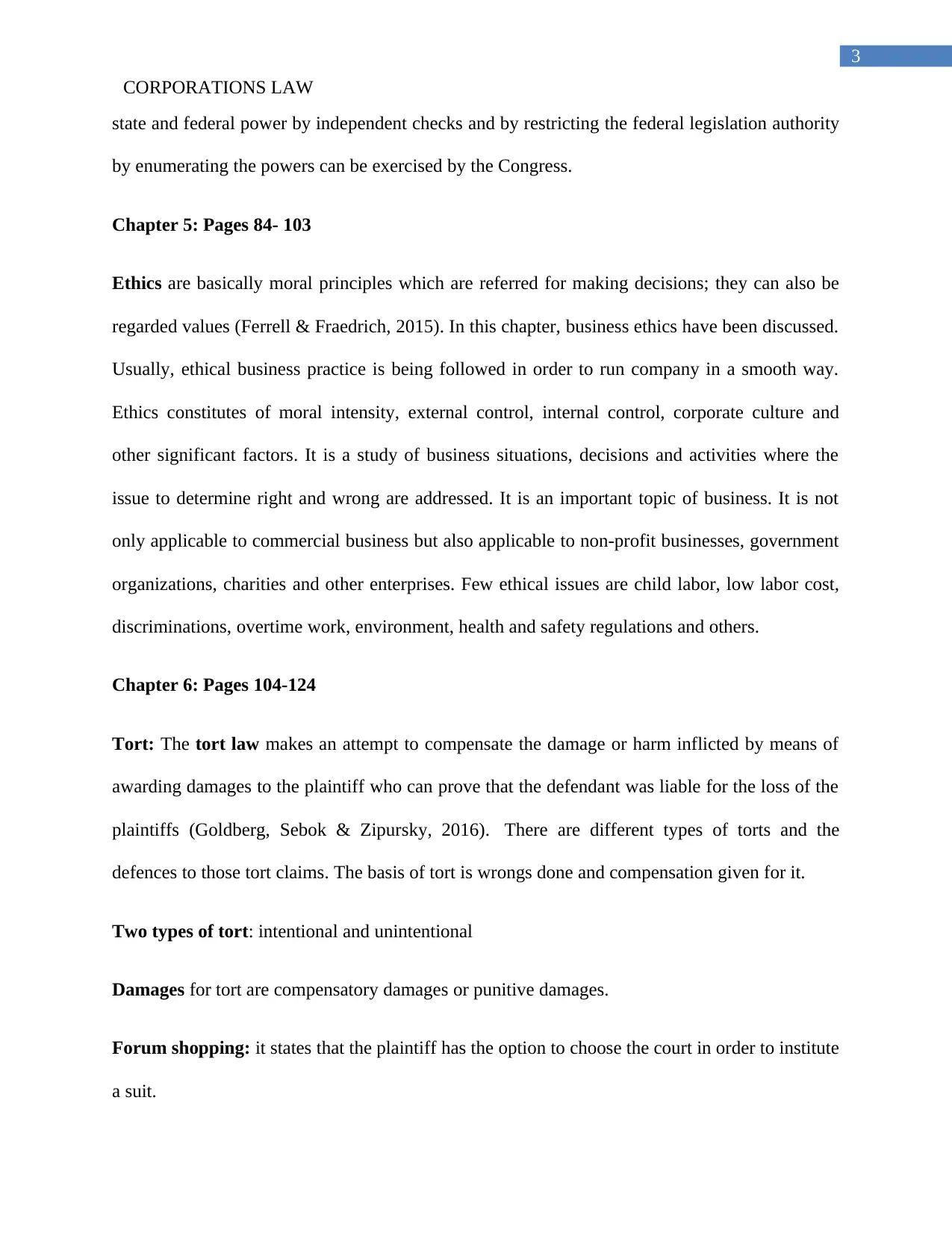
3
CORPORATIONS LAW
state and federal power by independent checks and by restricting the federal legislation authority
by enumerating the powers can be exercised by the Congress.
Chapter 5: Pages 84- 103
Ethics are basically moral principles which are referred for making decisions; they can also be
regarded values (Ferrell & Fraedrich, 2015). In this chapter, business ethics have been discussed.
Usually, ethical business practice is being followed in order to run company in a smooth way.
Ethics constitutes of moral intensity, external control, internal control, corporate culture and
other significant factors. It is a study of business situations, decisions and activities where the
issue to determine right and wrong are addressed. It is an important topic of business. It is not
only applicable to commercial business but also applicable to non-profit businesses, government
organizations, charities and other enterprises. Few ethical issues are child labor, low labor cost,
discriminations, overtime work, environment, health and safety regulations and others.
Chapter 6: Pages 104-124
Tort: The tort law makes an attempt to compensate the damage or harm inflicted by means of
awarding damages to the plaintiff who can prove that the defendant was liable for the loss of the
plaintiffs (Goldberg, Sebok & Zipursky, 2016). There are different types of torts and the
defences to those tort claims. The basis of tort is wrongs done and compensation given for it.
Two types of tort: intentional and unintentional
Damages for tort are compensatory damages or punitive damages.
Forum shopping: it states that the plaintiff has the option to choose the court in order to institute
a suit.
CORPORATIONS LAW
state and federal power by independent checks and by restricting the federal legislation authority
by enumerating the powers can be exercised by the Congress.
Chapter 5: Pages 84- 103
Ethics are basically moral principles which are referred for making decisions; they can also be
regarded values (Ferrell & Fraedrich, 2015). In this chapter, business ethics have been discussed.
Usually, ethical business practice is being followed in order to run company in a smooth way.
Ethics constitutes of moral intensity, external control, internal control, corporate culture and
other significant factors. It is a study of business situations, decisions and activities where the
issue to determine right and wrong are addressed. It is an important topic of business. It is not
only applicable to commercial business but also applicable to non-profit businesses, government
organizations, charities and other enterprises. Few ethical issues are child labor, low labor cost,
discriminations, overtime work, environment, health and safety regulations and others.
Chapter 6: Pages 104-124
Tort: The tort law makes an attempt to compensate the damage or harm inflicted by means of
awarding damages to the plaintiff who can prove that the defendant was liable for the loss of the
plaintiffs (Goldberg, Sebok & Zipursky, 2016). There are different types of torts and the
defences to those tort claims. The basis of tort is wrongs done and compensation given for it.
Two types of tort: intentional and unintentional
Damages for tort are compensatory damages or punitive damages.
Forum shopping: it states that the plaintiff has the option to choose the court in order to institute
a suit.
Paraphrase This Document
Need a fresh take? Get an instant paraphrase of this document with our AI Paraphraser
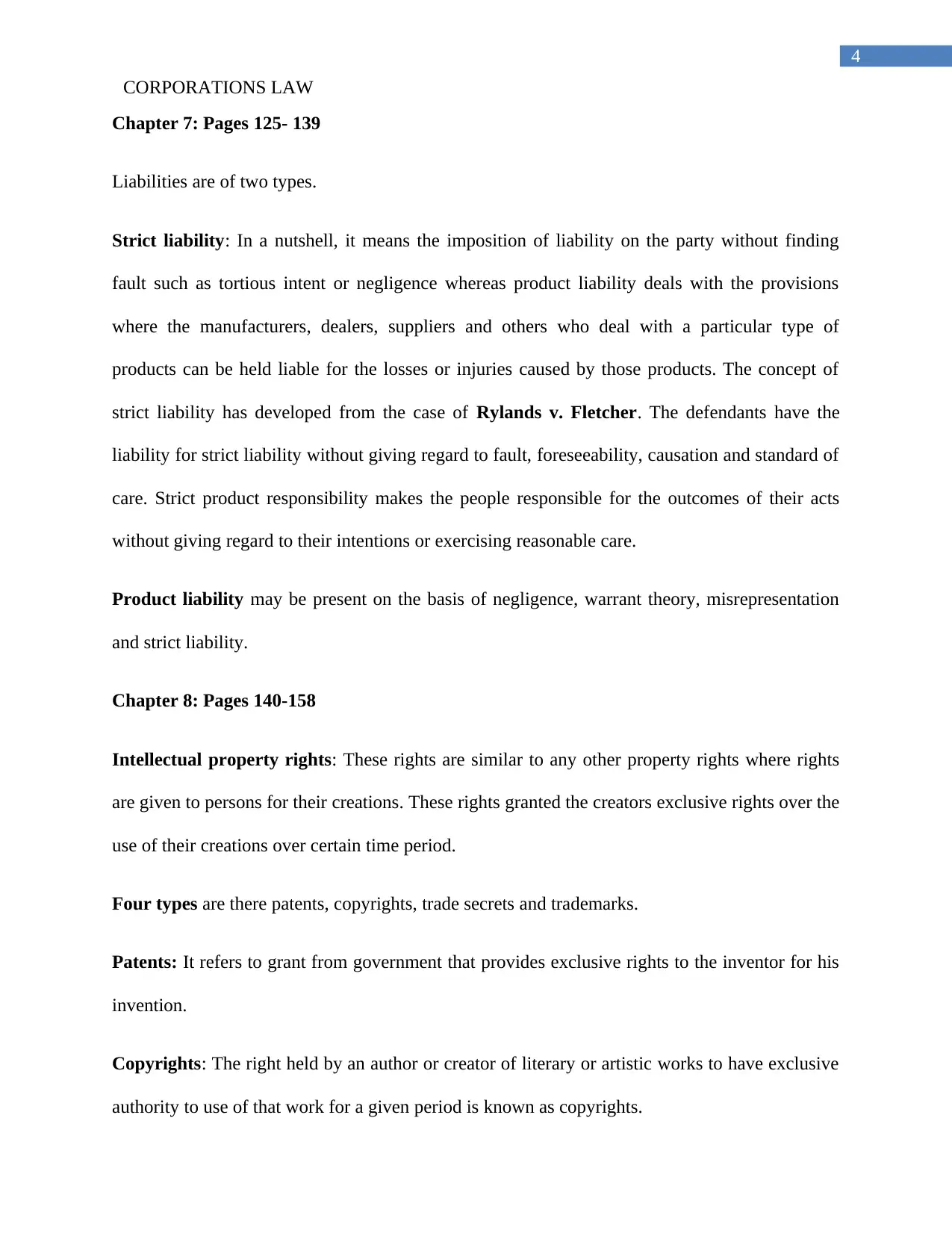
4
CORPORATIONS LAW
Chapter 7: Pages 125- 139
Liabilities are of two types.
Strict liability: In a nutshell, it means the imposition of liability on the party without finding
fault such as tortious intent or negligence whereas product liability deals with the provisions
where the manufacturers, dealers, suppliers and others who deal with a particular type of
products can be held liable for the losses or injuries caused by those products. The concept of
strict liability has developed from the case of Rylands v. Fletcher. The defendants have the
liability for strict liability without giving regard to fault, foreseeability, causation and standard of
care. Strict product responsibility makes the people responsible for the outcomes of their acts
without giving regard to their intentions or exercising reasonable care.
Product liability may be present on the basis of negligence, warrant theory, misrepresentation
and strict liability.
Chapter 8: Pages 140-158
Intellectual property rights: These rights are similar to any other property rights where rights
are given to persons for their creations. These rights granted the creators exclusive rights over the
use of their creations over certain time period.
Four types are there patents, copyrights, trade secrets and trademarks.
Patents: It refers to grant from government that provides exclusive rights to the inventor for his
invention.
Copyrights: The right held by an author or creator of literary or artistic works to have exclusive
authority to use of that work for a given period is known as copyrights.
CORPORATIONS LAW
Chapter 7: Pages 125- 139
Liabilities are of two types.
Strict liability: In a nutshell, it means the imposition of liability on the party without finding
fault such as tortious intent or negligence whereas product liability deals with the provisions
where the manufacturers, dealers, suppliers and others who deal with a particular type of
products can be held liable for the losses or injuries caused by those products. The concept of
strict liability has developed from the case of Rylands v. Fletcher. The defendants have the
liability for strict liability without giving regard to fault, foreseeability, causation and standard of
care. Strict product responsibility makes the people responsible for the outcomes of their acts
without giving regard to their intentions or exercising reasonable care.
Product liability may be present on the basis of negligence, warrant theory, misrepresentation
and strict liability.
Chapter 8: Pages 140-158
Intellectual property rights: These rights are similar to any other property rights where rights
are given to persons for their creations. These rights granted the creators exclusive rights over the
use of their creations over certain time period.
Four types are there patents, copyrights, trade secrets and trademarks.
Patents: It refers to grant from government that provides exclusive rights to the inventor for his
invention.
Copyrights: The right held by an author or creator of literary or artistic works to have exclusive
authority to use of that work for a given period is known as copyrights.
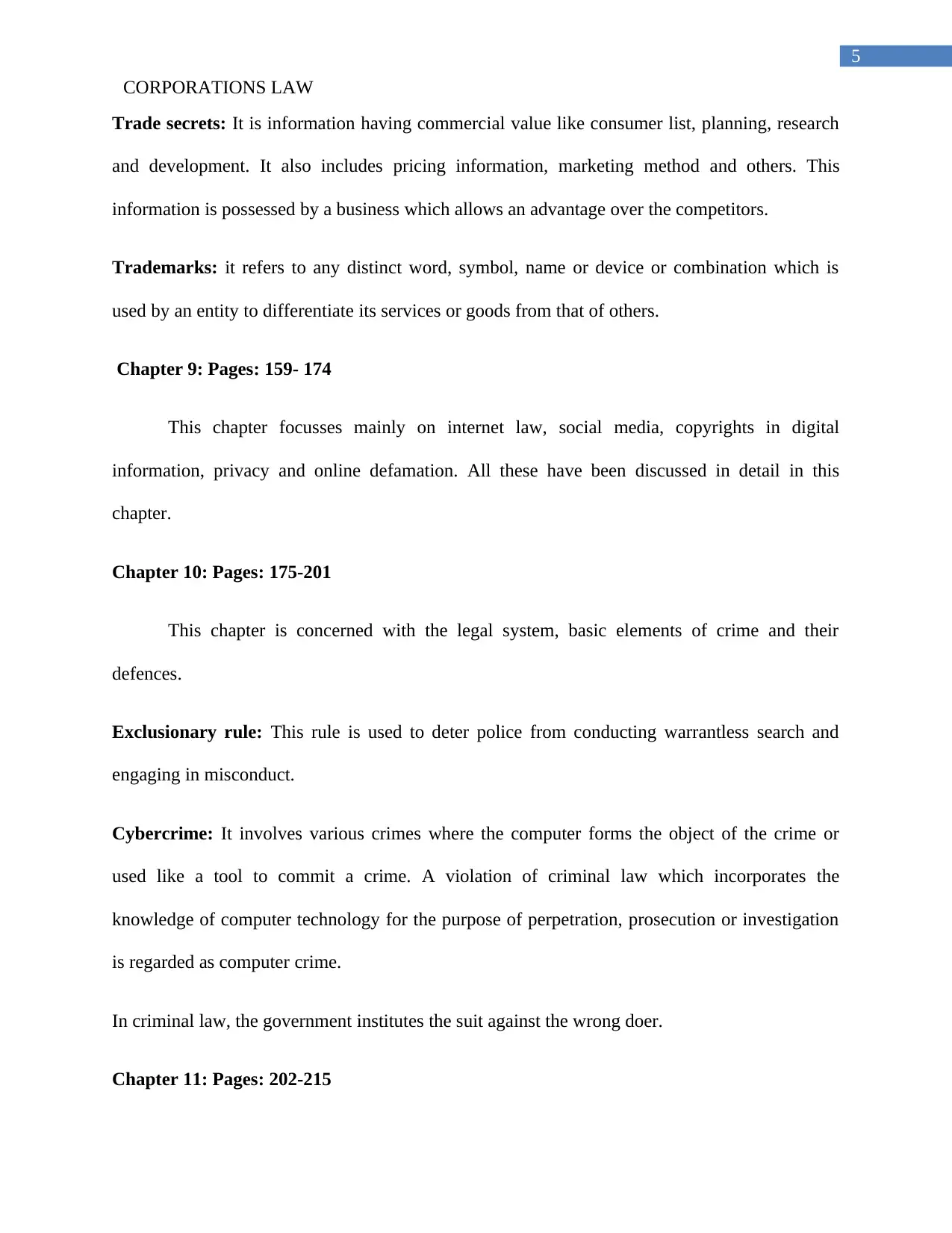
5
CORPORATIONS LAW
Trade secrets: It is information having commercial value like consumer list, planning, research
and development. It also includes pricing information, marketing method and others. This
information is possessed by a business which allows an advantage over the competitors.
Trademarks: it refers to any distinct word, symbol, name or device or combination which is
used by an entity to differentiate its services or goods from that of others.
Chapter 9: Pages: 159- 174
This chapter focusses mainly on internet law, social media, copyrights in digital
information, privacy and online defamation. All these have been discussed in detail in this
chapter.
Chapter 10: Pages: 175-201
This chapter is concerned with the legal system, basic elements of crime and their
defences.
Exclusionary rule: This rule is used to deter police from conducting warrantless search and
engaging in misconduct.
Cybercrime: It involves various crimes where the computer forms the object of the crime or
used like a tool to commit a crime. A violation of criminal law which incorporates the
knowledge of computer technology for the purpose of perpetration, prosecution or investigation
is regarded as computer crime.
In criminal law, the government institutes the suit against the wrong doer.
Chapter 11: Pages: 202-215
CORPORATIONS LAW
Trade secrets: It is information having commercial value like consumer list, planning, research
and development. It also includes pricing information, marketing method and others. This
information is possessed by a business which allows an advantage over the competitors.
Trademarks: it refers to any distinct word, symbol, name or device or combination which is
used by an entity to differentiate its services or goods from that of others.
Chapter 9: Pages: 159- 174
This chapter focusses mainly on internet law, social media, copyrights in digital
information, privacy and online defamation. All these have been discussed in detail in this
chapter.
Chapter 10: Pages: 175-201
This chapter is concerned with the legal system, basic elements of crime and their
defences.
Exclusionary rule: This rule is used to deter police from conducting warrantless search and
engaging in misconduct.
Cybercrime: It involves various crimes where the computer forms the object of the crime or
used like a tool to commit a crime. A violation of criminal law which incorporates the
knowledge of computer technology for the purpose of perpetration, prosecution or investigation
is regarded as computer crime.
In criminal law, the government institutes the suit against the wrong doer.
Chapter 11: Pages: 202-215
⊘ This is a preview!⊘
Do you want full access?
Subscribe today to unlock all pages.

Trusted by 1+ million students worldwide
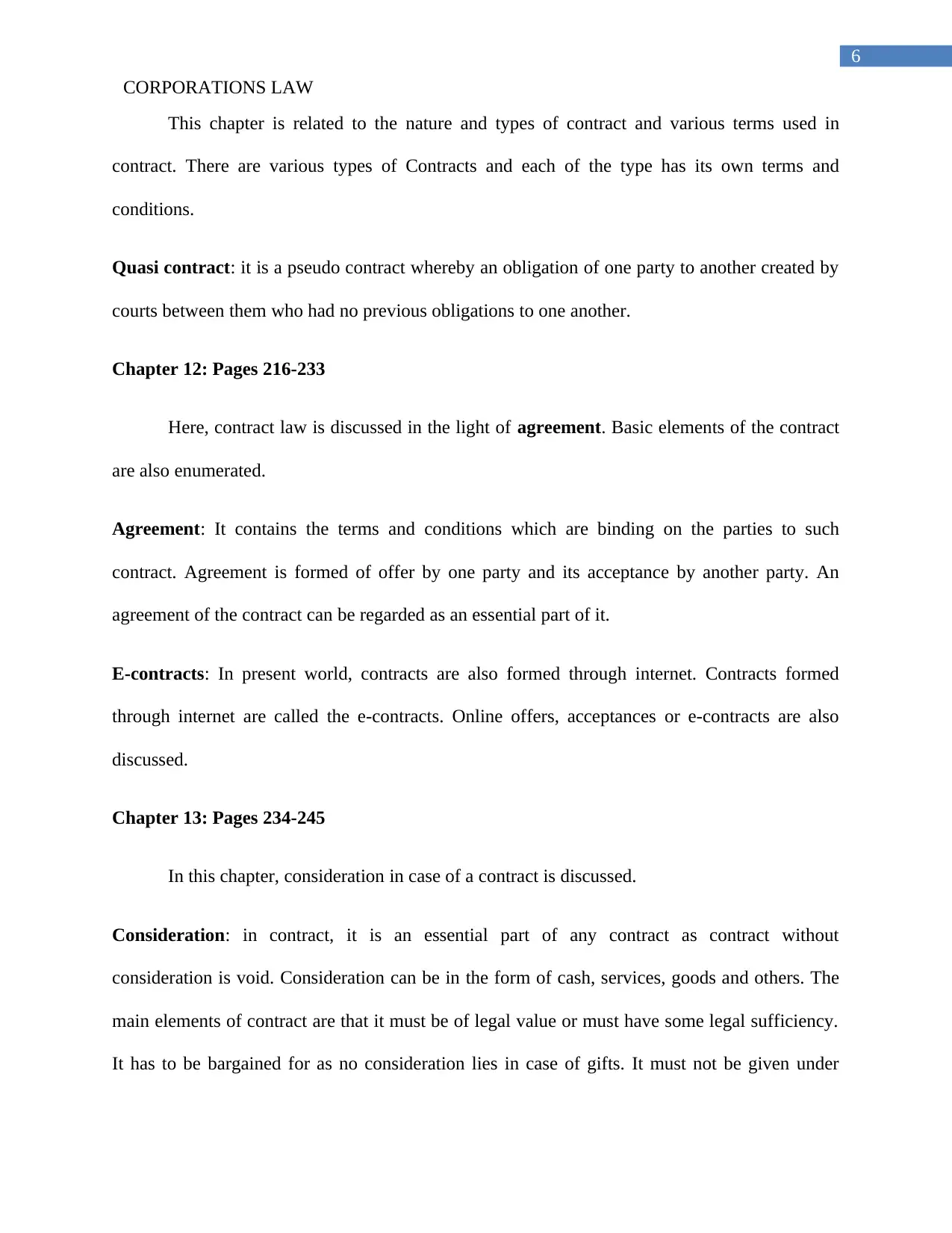
6
CORPORATIONS LAW
This chapter is related to the nature and types of contract and various terms used in
contract. There are various types of Contracts and each of the type has its own terms and
conditions.
Quasi contract: it is a pseudo contract whereby an obligation of one party to another created by
courts between them who had no previous obligations to one another.
Chapter 12: Pages 216-233
Here, contract law is discussed in the light of agreement. Basic elements of the contract
are also enumerated.
Agreement: It contains the terms and conditions which are binding on the parties to such
contract. Agreement is formed of offer by one party and its acceptance by another party. An
agreement of the contract can be regarded as an essential part of it.
E-contracts: In present world, contracts are also formed through internet. Contracts formed
through internet are called the e-contracts. Online offers, acceptances or e-contracts are also
discussed.
Chapter 13: Pages 234-245
In this chapter, consideration in case of a contract is discussed.
Consideration: in contract, it is an essential part of any contract as contract without
consideration is void. Consideration can be in the form of cash, services, goods and others. The
main elements of contract are that it must be of legal value or must have some legal sufficiency.
It has to be bargained for as no consideration lies in case of gifts. It must not be given under
CORPORATIONS LAW
This chapter is related to the nature and types of contract and various terms used in
contract. There are various types of Contracts and each of the type has its own terms and
conditions.
Quasi contract: it is a pseudo contract whereby an obligation of one party to another created by
courts between them who had no previous obligations to one another.
Chapter 12: Pages 216-233
Here, contract law is discussed in the light of agreement. Basic elements of the contract
are also enumerated.
Agreement: It contains the terms and conditions which are binding on the parties to such
contract. Agreement is formed of offer by one party and its acceptance by another party. An
agreement of the contract can be regarded as an essential part of it.
E-contracts: In present world, contracts are also formed through internet. Contracts formed
through internet are called the e-contracts. Online offers, acceptances or e-contracts are also
discussed.
Chapter 13: Pages 234-245
In this chapter, consideration in case of a contract is discussed.
Consideration: in contract, it is an essential part of any contract as contract without
consideration is void. Consideration can be in the form of cash, services, goods and others. The
main elements of contract are that it must be of legal value or must have some legal sufficiency.
It has to be bargained for as no consideration lies in case of gifts. It must not be given under
Paraphrase This Document
Need a fresh take? Get an instant paraphrase of this document with our AI Paraphraser
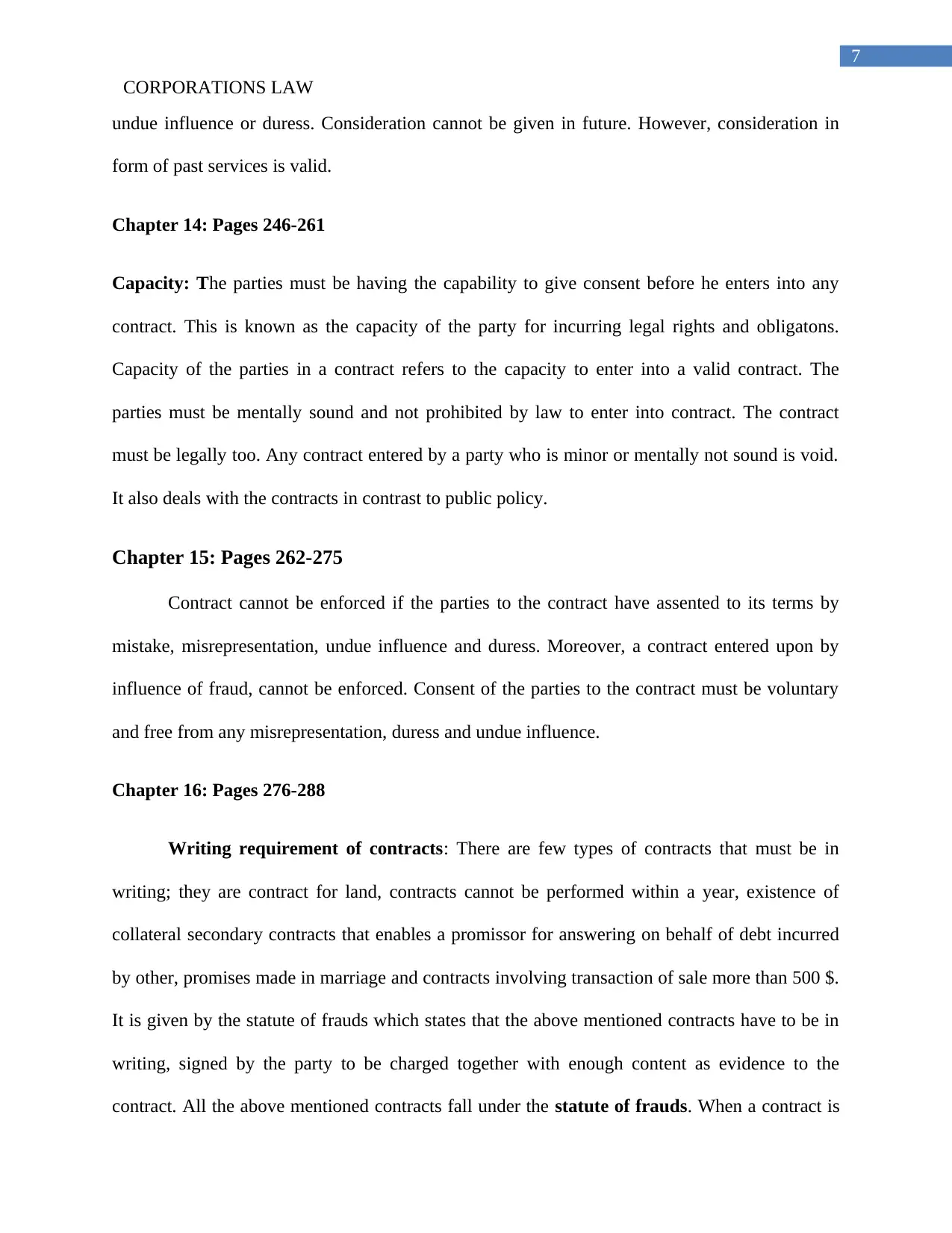
7
CORPORATIONS LAW
undue influence or duress. Consideration cannot be given in future. However, consideration in
form of past services is valid.
Chapter 14: Pages 246-261
Capacity: The parties must be having the capability to give consent before he enters into any
contract. This is known as the capacity of the party for incurring legal rights and obligatons.
Capacity of the parties in a contract refers to the capacity to enter into a valid contract. The
parties must be mentally sound and not prohibited by law to enter into contract. The contract
must be legally too. Any contract entered by a party who is minor or mentally not sound is void.
It also deals with the contracts in contrast to public policy.
Chapter 15: Pages 262-275
Contract cannot be enforced if the parties to the contract have assented to its terms by
mistake, misrepresentation, undue influence and duress. Moreover, a contract entered upon by
influence of fraud, cannot be enforced. Consent of the parties to the contract must be voluntary
and free from any misrepresentation, duress and undue influence.
Chapter 16: Pages 276-288
Writing requirement of contracts: There are few types of contracts that must be in
writing; they are contract for land, contracts cannot be performed within a year, existence of
collateral secondary contracts that enables a promissor for answering on behalf of debt incurred
by other, promises made in marriage and contracts involving transaction of sale more than 500 $.
It is given by the statute of frauds which states that the above mentioned contracts have to be in
writing, signed by the party to be charged together with enough content as evidence to the
contract. All the above mentioned contracts fall under the statute of frauds. When a contract is
CORPORATIONS LAW
undue influence or duress. Consideration cannot be given in future. However, consideration in
form of past services is valid.
Chapter 14: Pages 246-261
Capacity: The parties must be having the capability to give consent before he enters into any
contract. This is known as the capacity of the party for incurring legal rights and obligatons.
Capacity of the parties in a contract refers to the capacity to enter into a valid contract. The
parties must be mentally sound and not prohibited by law to enter into contract. The contract
must be legally too. Any contract entered by a party who is minor or mentally not sound is void.
It also deals with the contracts in contrast to public policy.
Chapter 15: Pages 262-275
Contract cannot be enforced if the parties to the contract have assented to its terms by
mistake, misrepresentation, undue influence and duress. Moreover, a contract entered upon by
influence of fraud, cannot be enforced. Consent of the parties to the contract must be voluntary
and free from any misrepresentation, duress and undue influence.
Chapter 16: Pages 276-288
Writing requirement of contracts: There are few types of contracts that must be in
writing; they are contract for land, contracts cannot be performed within a year, existence of
collateral secondary contracts that enables a promissor for answering on behalf of debt incurred
by other, promises made in marriage and contracts involving transaction of sale more than 500 $.
It is given by the statute of frauds which states that the above mentioned contracts have to be in
writing, signed by the party to be charged together with enough content as evidence to the
contract. All the above mentioned contracts fall under the statute of frauds. When a contract is
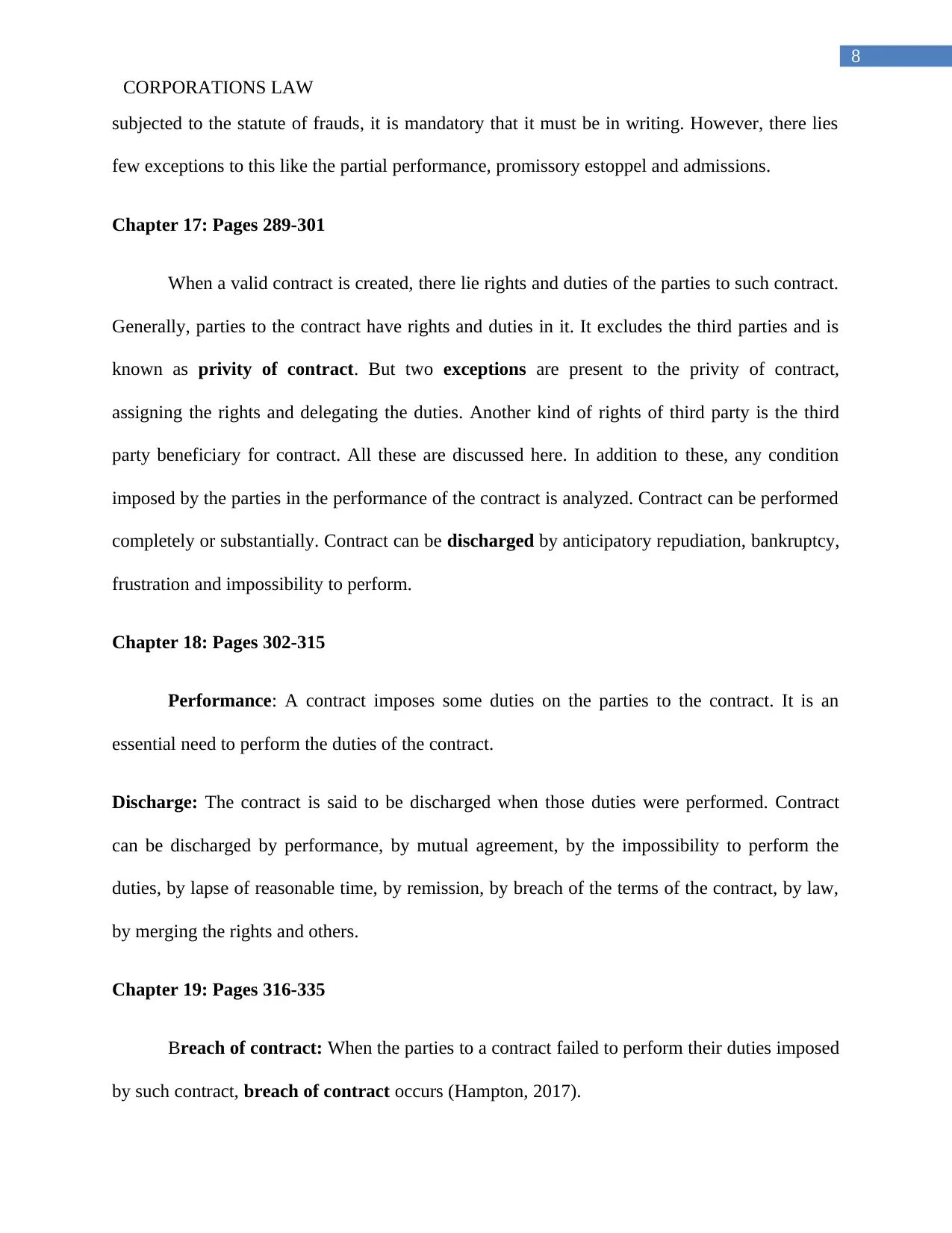
8
CORPORATIONS LAW
subjected to the statute of frauds, it is mandatory that it must be in writing. However, there lies
few exceptions to this like the partial performance, promissory estoppel and admissions.
Chapter 17: Pages 289-301
When a valid contract is created, there lie rights and duties of the parties to such contract.
Generally, parties to the contract have rights and duties in it. It excludes the third parties and is
known as privity of contract. But two exceptions are present to the privity of contract,
assigning the rights and delegating the duties. Another kind of rights of third party is the third
party beneficiary for contract. All these are discussed here. In addition to these, any condition
imposed by the parties in the performance of the contract is analyzed. Contract can be performed
completely or substantially. Contract can be discharged by anticipatory repudiation, bankruptcy,
frustration and impossibility to perform.
Chapter 18: Pages 302-315
Performance: A contract imposes some duties on the parties to the contract. It is an
essential need to perform the duties of the contract.
Discharge: The contract is said to be discharged when those duties were performed. Contract
can be discharged by performance, by mutual agreement, by the impossibility to perform the
duties, by lapse of reasonable time, by remission, by breach of the terms of the contract, by law,
by merging the rights and others.
Chapter 19: Pages 316-335
Breach of contract: When the parties to a contract failed to perform their duties imposed
by such contract, breach of contract occurs (Hampton, 2017).
CORPORATIONS LAW
subjected to the statute of frauds, it is mandatory that it must be in writing. However, there lies
few exceptions to this like the partial performance, promissory estoppel and admissions.
Chapter 17: Pages 289-301
When a valid contract is created, there lie rights and duties of the parties to such contract.
Generally, parties to the contract have rights and duties in it. It excludes the third parties and is
known as privity of contract. But two exceptions are present to the privity of contract,
assigning the rights and delegating the duties. Another kind of rights of third party is the third
party beneficiary for contract. All these are discussed here. In addition to these, any condition
imposed by the parties in the performance of the contract is analyzed. Contract can be performed
completely or substantially. Contract can be discharged by anticipatory repudiation, bankruptcy,
frustration and impossibility to perform.
Chapter 18: Pages 302-315
Performance: A contract imposes some duties on the parties to the contract. It is an
essential need to perform the duties of the contract.
Discharge: The contract is said to be discharged when those duties were performed. Contract
can be discharged by performance, by mutual agreement, by the impossibility to perform the
duties, by lapse of reasonable time, by remission, by breach of the terms of the contract, by law,
by merging the rights and others.
Chapter 19: Pages 316-335
Breach of contract: When the parties to a contract failed to perform their duties imposed
by such contract, breach of contract occurs (Hampton, 2017).
⊘ This is a preview!⊘
Do you want full access?
Subscribe today to unlock all pages.

Trusted by 1+ million students worldwide
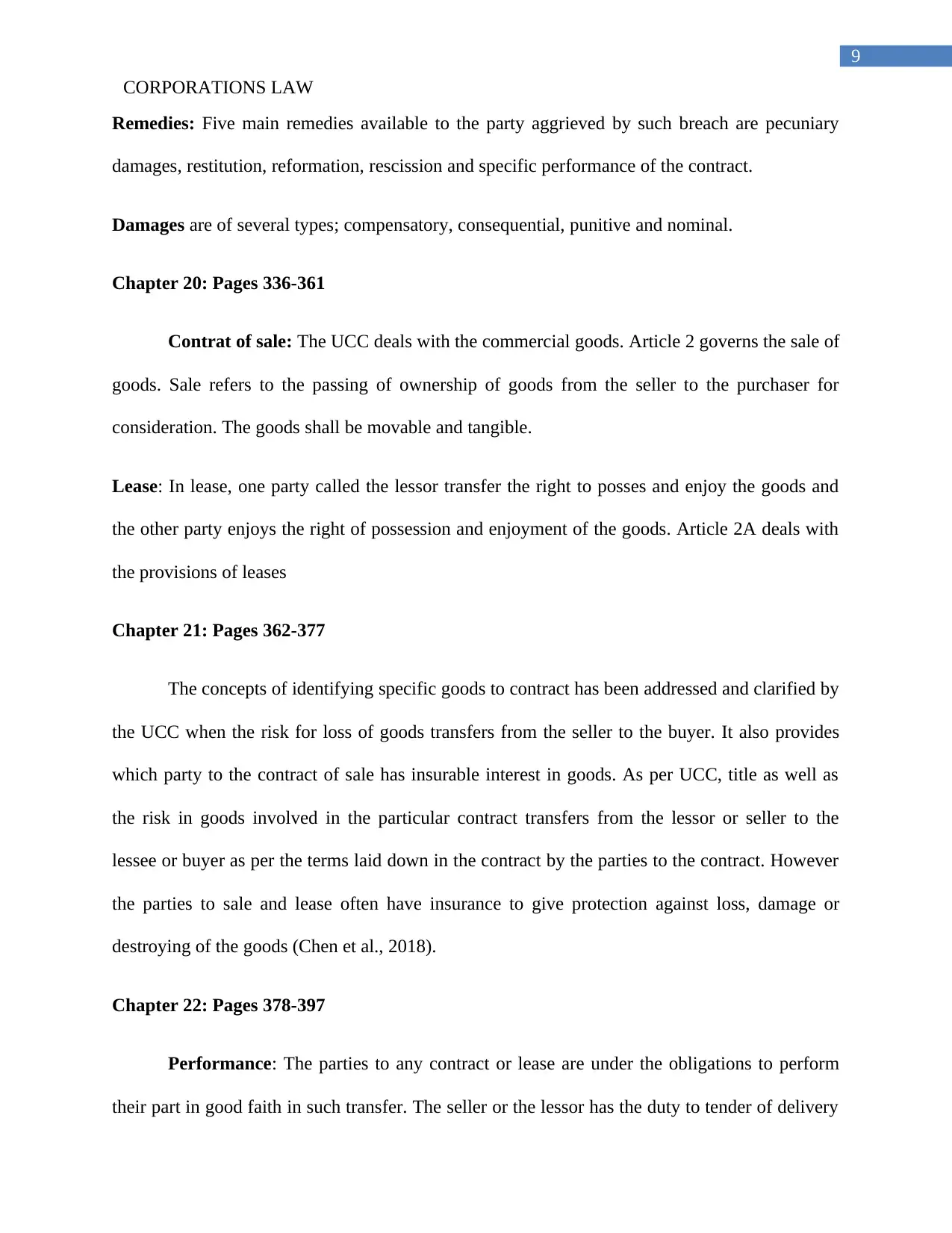
9
CORPORATIONS LAW
Remedies: Five main remedies available to the party aggrieved by such breach are pecuniary
damages, restitution, reformation, rescission and specific performance of the contract.
Damages are of several types; compensatory, consequential, punitive and nominal.
Chapter 20: Pages 336-361
Contrat of sale: The UCC deals with the commercial goods. Article 2 governs the sale of
goods. Sale refers to the passing of ownership of goods from the seller to the purchaser for
consideration. The goods shall be movable and tangible.
Lease: In lease, one party called the lessor transfer the right to posses and enjoy the goods and
the other party enjoys the right of possession and enjoyment of the goods. Article 2A deals with
the provisions of leases
Chapter 21: Pages 362-377
The concepts of identifying specific goods to contract has been addressed and clarified by
the UCC when the risk for loss of goods transfers from the seller to the buyer. It also provides
which party to the contract of sale has insurable interest in goods. As per UCC, title as well as
the risk in goods involved in the particular contract transfers from the lessor or seller to the
lessee or buyer as per the terms laid down in the contract by the parties to the contract. However
the parties to sale and lease often have insurance to give protection against loss, damage or
destroying of the goods (Chen et al., 2018).
Chapter 22: Pages 378-397
Performance: The parties to any contract or lease are under the obligations to perform
their part in good faith in such transfer. The seller or the lessor has the duty to tender of delivery
CORPORATIONS LAW
Remedies: Five main remedies available to the party aggrieved by such breach are pecuniary
damages, restitution, reformation, rescission and specific performance of the contract.
Damages are of several types; compensatory, consequential, punitive and nominal.
Chapter 20: Pages 336-361
Contrat of sale: The UCC deals with the commercial goods. Article 2 governs the sale of
goods. Sale refers to the passing of ownership of goods from the seller to the purchaser for
consideration. The goods shall be movable and tangible.
Lease: In lease, one party called the lessor transfer the right to posses and enjoy the goods and
the other party enjoys the right of possession and enjoyment of the goods. Article 2A deals with
the provisions of leases
Chapter 21: Pages 362-377
The concepts of identifying specific goods to contract has been addressed and clarified by
the UCC when the risk for loss of goods transfers from the seller to the buyer. It also provides
which party to the contract of sale has insurable interest in goods. As per UCC, title as well as
the risk in goods involved in the particular contract transfers from the lessor or seller to the
lessee or buyer as per the terms laid down in the contract by the parties to the contract. However
the parties to sale and lease often have insurance to give protection against loss, damage or
destroying of the goods (Chen et al., 2018).
Chapter 22: Pages 378-397
Performance: The parties to any contract or lease are under the obligations to perform
their part in good faith in such transfer. The seller or the lessor has the duty to tender of delivery
Paraphrase This Document
Need a fresh take? Get an instant paraphrase of this document with our AI Paraphraser
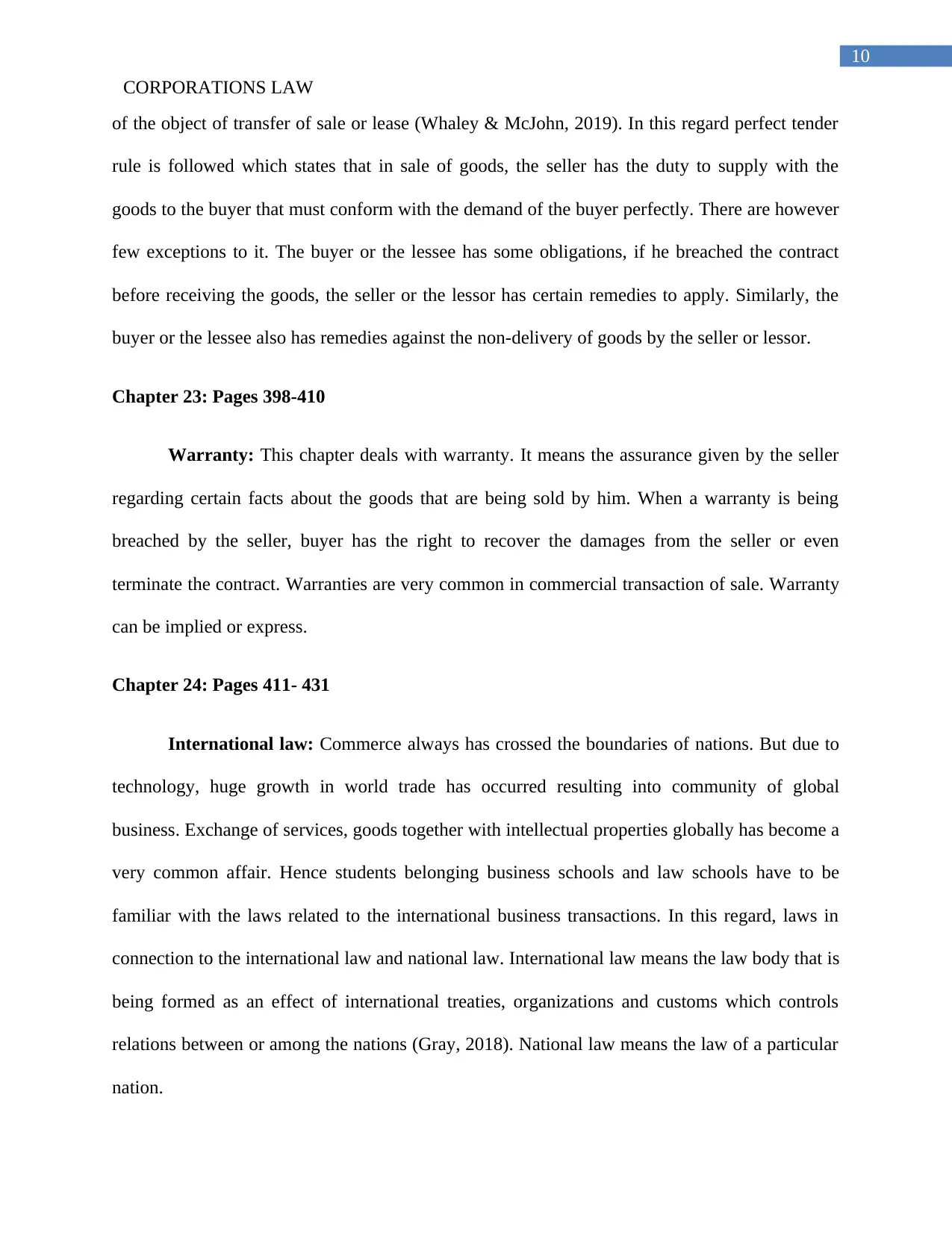
10
CORPORATIONS LAW
of the object of transfer of sale or lease (Whaley & McJohn, 2019). In this regard perfect tender
rule is followed which states that in sale of goods, the seller has the duty to supply with the
goods to the buyer that must conform with the demand of the buyer perfectly. There are however
few exceptions to it. The buyer or the lessee has some obligations, if he breached the contract
before receiving the goods, the seller or the lessor has certain remedies to apply. Similarly, the
buyer or the lessee also has remedies against the non-delivery of goods by the seller or lessor.
Chapter 23: Pages 398-410
Warranty: This chapter deals with warranty. It means the assurance given by the seller
regarding certain facts about the goods that are being sold by him. When a warranty is being
breached by the seller, buyer has the right to recover the damages from the seller or even
terminate the contract. Warranties are very common in commercial transaction of sale. Warranty
can be implied or express.
Chapter 24: Pages 411- 431
International law: Commerce always has crossed the boundaries of nations. But due to
technology, huge growth in world trade has occurred resulting into community of global
business. Exchange of services, goods together with intellectual properties globally has become a
very common affair. Hence students belonging business schools and law schools have to be
familiar with the laws related to the international business transactions. In this regard, laws in
connection to the international law and national law. International law means the law body that is
being formed as an effect of international treaties, organizations and customs which controls
relations between or among the nations (Gray, 2018). National law means the law of a particular
nation.
CORPORATIONS LAW
of the object of transfer of sale or lease (Whaley & McJohn, 2019). In this regard perfect tender
rule is followed which states that in sale of goods, the seller has the duty to supply with the
goods to the buyer that must conform with the demand of the buyer perfectly. There are however
few exceptions to it. The buyer or the lessee has some obligations, if he breached the contract
before receiving the goods, the seller or the lessor has certain remedies to apply. Similarly, the
buyer or the lessee also has remedies against the non-delivery of goods by the seller or lessor.
Chapter 23: Pages 398-410
Warranty: This chapter deals with warranty. It means the assurance given by the seller
regarding certain facts about the goods that are being sold by him. When a warranty is being
breached by the seller, buyer has the right to recover the damages from the seller or even
terminate the contract. Warranties are very common in commercial transaction of sale. Warranty
can be implied or express.
Chapter 24: Pages 411- 431
International law: Commerce always has crossed the boundaries of nations. But due to
technology, huge growth in world trade has occurred resulting into community of global
business. Exchange of services, goods together with intellectual properties globally has become a
very common affair. Hence students belonging business schools and law schools have to be
familiar with the laws related to the international business transactions. In this regard, laws in
connection to the international law and national law. International law means the law body that is
being formed as an effect of international treaties, organizations and customs which controls
relations between or among the nations (Gray, 2018). National law means the law of a particular
nation.
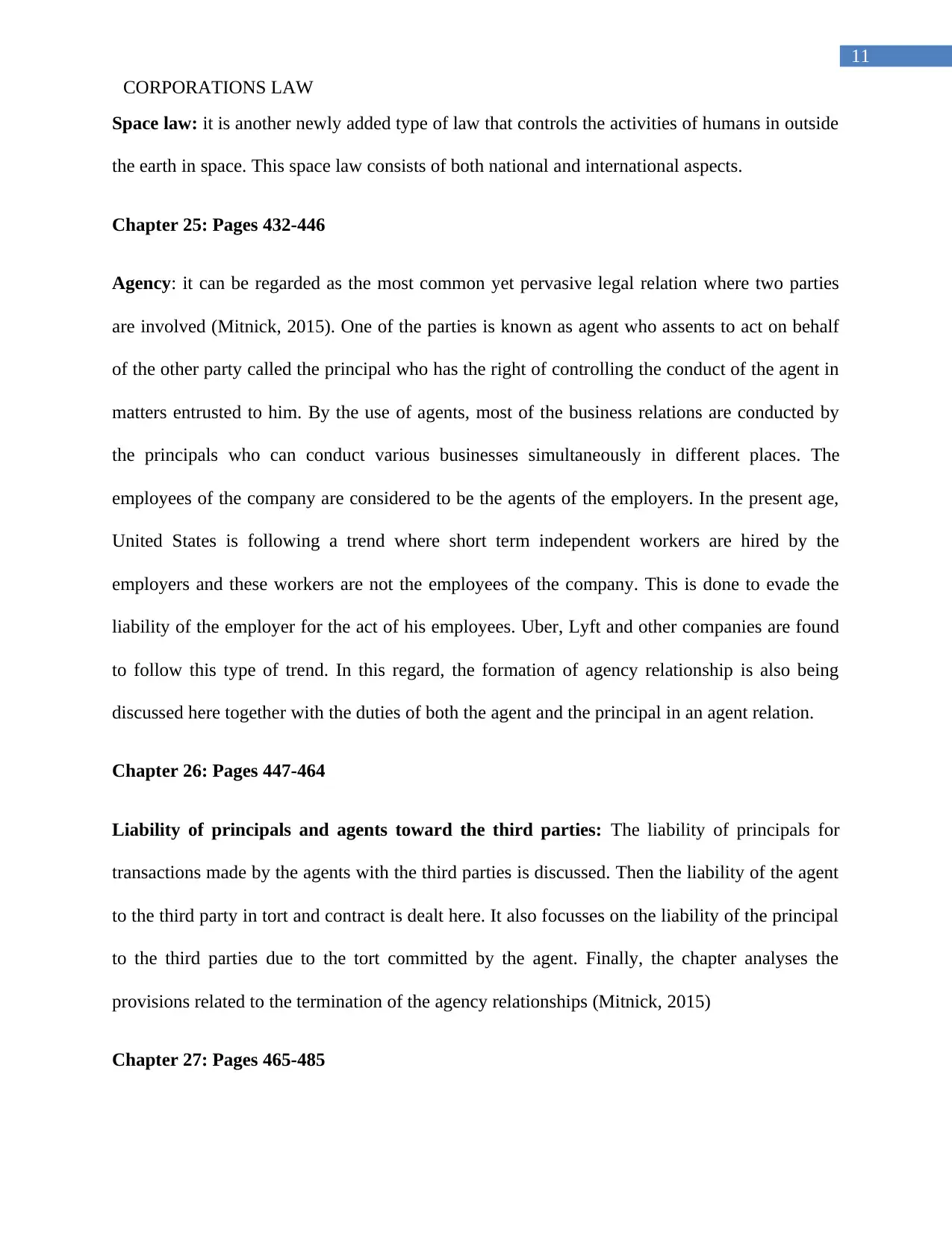
11
CORPORATIONS LAW
Space law: it is another newly added type of law that controls the activities of humans in outside
the earth in space. This space law consists of both national and international aspects.
Chapter 25: Pages 432-446
Agency: it can be regarded as the most common yet pervasive legal relation where two parties
are involved (Mitnick, 2015). One of the parties is known as agent who assents to act on behalf
of the other party called the principal who has the right of controlling the conduct of the agent in
matters entrusted to him. By the use of agents, most of the business relations are conducted by
the principals who can conduct various businesses simultaneously in different places. The
employees of the company are considered to be the agents of the employers. In the present age,
United States is following a trend where short term independent workers are hired by the
employers and these workers are not the employees of the company. This is done to evade the
liability of the employer for the act of his employees. Uber, Lyft and other companies are found
to follow this type of trend. In this regard, the formation of agency relationship is also being
discussed here together with the duties of both the agent and the principal in an agent relation.
Chapter 26: Pages 447-464
Liability of principals and agents toward the third parties: The liability of principals for
transactions made by the agents with the third parties is discussed. Then the liability of the agent
to the third party in tort and contract is dealt here. It also focusses on the liability of the principal
to the third parties due to the tort committed by the agent. Finally, the chapter analyses the
provisions related to the termination of the agency relationships (Mitnick, 2015)
Chapter 27: Pages 465-485
CORPORATIONS LAW
Space law: it is another newly added type of law that controls the activities of humans in outside
the earth in space. This space law consists of both national and international aspects.
Chapter 25: Pages 432-446
Agency: it can be regarded as the most common yet pervasive legal relation where two parties
are involved (Mitnick, 2015). One of the parties is known as agent who assents to act on behalf
of the other party called the principal who has the right of controlling the conduct of the agent in
matters entrusted to him. By the use of agents, most of the business relations are conducted by
the principals who can conduct various businesses simultaneously in different places. The
employees of the company are considered to be the agents of the employers. In the present age,
United States is following a trend where short term independent workers are hired by the
employers and these workers are not the employees of the company. This is done to evade the
liability of the employer for the act of his employees. Uber, Lyft and other companies are found
to follow this type of trend. In this regard, the formation of agency relationship is also being
discussed here together with the duties of both the agent and the principal in an agent relation.
Chapter 26: Pages 447-464
Liability of principals and agents toward the third parties: The liability of principals for
transactions made by the agents with the third parties is discussed. Then the liability of the agent
to the third party in tort and contract is dealt here. It also focusses on the liability of the principal
to the third parties due to the tort committed by the agent. Finally, the chapter analyses the
provisions related to the termination of the agency relationships (Mitnick, 2015)
Chapter 27: Pages 465-485
⊘ This is a preview!⊘
Do you want full access?
Subscribe today to unlock all pages.

Trusted by 1+ million students worldwide
1 out of 19
Related Documents
Your All-in-One AI-Powered Toolkit for Academic Success.
+13062052269
info@desklib.com
Available 24*7 on WhatsApp / Email
![[object Object]](/_next/static/media/star-bottom.7253800d.svg)
Unlock your academic potential
Copyright © 2020–2026 A2Z Services. All Rights Reserved. Developed and managed by ZUCOL.





